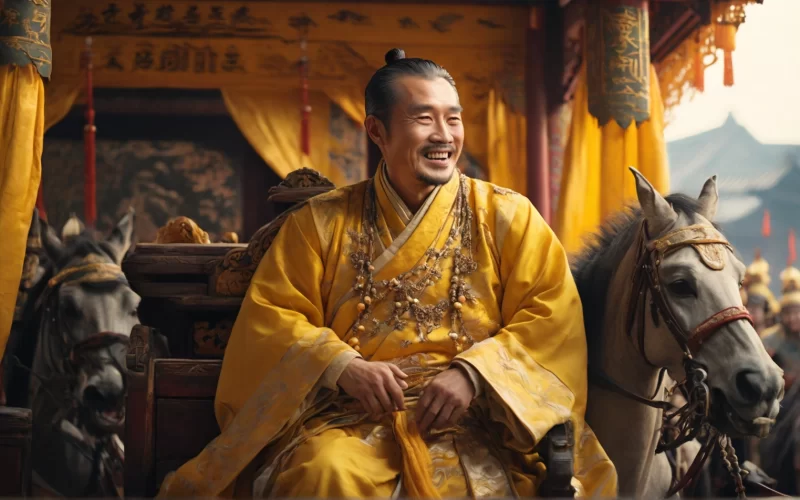Idiom Explanation:
Originally referring to the preference of feudal emperors to expand their territories, it now refers to the desire to do great things, make great achievements, or the love of publicity, regardless of whether conditions permit.
Pronunciation:
好大喜功
hào dà xǐ gōng
Origin:
宋·欧阳修、宋祁等《新唐书·太宗本纪》:“至其牵于多爱,复立浮图,好大喜功,勤兵于远,此中材庸主之所常为。”
Story:
Li Shimin followed his father Li Yuan to take advantage of the rebellion at the end of the Sui Dynasty and fought in the north and south, winning numerous battles and making great contributions to the pacification of civil unrest and the establishment of the Li Tang Dynasty. Later, Li Shimin succeeded Li Yuan to the throne and became the second king of the Tang Dynasty. As a famous and enlightened ruler in Chinese history, Li Shimin, Emperor Taizong of Tang Dynasty, was an eloquent politician and military man who achieved brilliant achievements and brought the development of Chinese feudal society to its peak.
However, as a feudal emperor with nine words, Li Shimin could not escape from his historical limitations. "Li Shimin also had many shortcomings that feudal emperors could not get rid of. The author of the New Book of Tang compares Li Shimin to the ancient King Wu of the Zhou Dynasty, but also points out that he was "so pleased with himself that he was diligent with his troops.
In the sixth year of Zhenguan, the ministers proposed that Li Shimin perform the ritual of zen, but Wei Zheng opposed it. Li Shimin then asked Wei Zheng in anger: "I am not high in merit? "Virtue is not thick enough?" "The valley of the year is not yet?" "China is not safe?" "The distant barbarians are not yet admired?" Wei Zheng acknowledged that Li Shimin had indeed made brilliant achievements in these areas, but at the same time pointed out that it was not enough. From the two men's question and answer, it is clear that Li Shimin had by now developed complacency and was complacent about the victories and successes he had achieved.
The exposure of Li Shimin's shortcomings was mainly concentrated after the tenth year of Zhenguan. In the eleventh year of the reign, Wei Zheng pointed out that he already had "deeper and deeper intentions" and that "the law had no definite subject, and he let his feelings be light and heavy". Zhang Liang, Zhang Yungu and Lu Zushan were executed for minor crimes and heavy sentences under the circumstances of this kind of anger. Therefore, it has been pointed out that in the late period of Zhenguan, Li Shimin often used his words instead of the law to destroy the legal system he had established, which was tantamount to disrupting his own law.
In the thirteenth year of the Zhenguan period, Wei Zheng presented his famous "Ten Graduals" and launched a comprehensive criticism of Li Shimin. Although Li Shimin's reputation for "following advice like a stream" is a household name, he was not a perfect person in this respect, and sometimes he did not accept advice willingly. On one occasion, he almost killed Wei Zheng, who had been outspoken, if not for the queen's reminder.
In the nineteenth year of Zhenguan, the great Li Shimin refused the advice of Chu Suiliang, Zhang Liang, Li Daliang and other ministers, and was bent on raising a division to conquer Goryeo, and returned with a disastrous defeat. The war was costly and weakened the power of the Tang Dynasty. On the way back to the imperial court, Li Shimin sighed sullenly and said, "If Wei Zheng had been here, he would not have made me do the same thing." In fact, although Wei Zheng had already passed away, there was no lack of ministers in the dynasty who advised him bitterly, but Li Shimin's desire to pursue his own personal success had confused his mind.
Although the expedition to Goryeo ended in defeat, however, Li Shimin did not learn enough lessons from it, but was headstrong and obstinate, and stubbornly prepared to launch another war to conquer Goryeo, and in the next few years, he trained his navy and built warships. In this way, Li Shimin slid further and further down the political slippery slope to the end of his life in order to expand the power of the Tang Dynasty.
Similar Idioms:
- 好高骛远
- 沽名钓誉
- 急功好利












